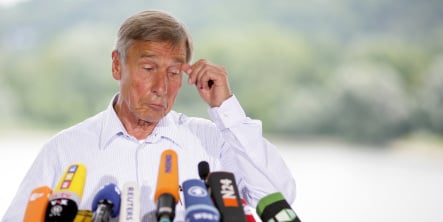Clements said he did not mean to insult the SPD in the German state of Hesse when he attacked the party’s leading candidate, Andrea Ypsilanti, during a close-fought state election in January. But he refused to retract his criticism of Ypsilanti’s energy policy.
“I am sorry if these kinds of emotions were roused,” Clement said at a press conference in Bonn. “I am and will remain a Social Democrat.”
Clement, who arrived at the Thursday press conference by bicycle, was the long-time premier of the German state of North Rhine-Westphalia and for years one of the SPD’s leading politicians.
An arbitration committee from North Rhine-Westphalia decided to boot him out of the party after his Ypsilanti comments, which came under considerable fire from the party’s left-wing.
In a guest column for a conservative newspaper, Clemens had argued that Ypsilanti would hobble the regional economy due to her vocal opposition of coal-fuelled power plans and nuclear energy.
On Thursday, Clemens said it is not true that his op-ed advised voters to steer clear of Ypsilanti. He also refused to back down from his position on coal and atomic energy, referring to them reliable energy sources in a time of increasing uncertainty in the worldwide energy supply.
“An abandonment of these two sources of energy or of others is not defensible,” Clemens said, adding that a switch to renewable energy within 10 years would endanger Germany’s industrial base and imperil tens of thousands of jobs.
Long an SPD centrist, Clement, 68, served as North Rhine-Westphalia state premier from 1998 to 2002 then as the “super-minister” for economy and labour under Schröder until 2005. During that period he incensed the left-wing of the party as one of the architects of former chancellor Gerhard Schröder’s disputed Agenda 2010 economic programme.
Since leaving office, Clement frequently has criticized the SPD’s moves to roll back the economic reforms he helped conceive under Schröder. Calls for his ouster multiplied and after disciplining him in April, the party finally opted to expel him on July 31. He has vowed to appeal the decision.
dpa/afp




 Please whitelist us to continue reading.
Please whitelist us to continue reading.